The Netflix series IC 814: The Kandahar Hijack is a dramatized retelling of the harrowing hijacking of Indian Airlines flight IC 814 in December 1999. While the show aims to capture the intense drama and human stories behind the seven-day crisis, it undeniably carries a narrative that could be seen as critical of Pakistan.
The series portrays the hijacking as orchestrated by militants from Pakistan’s Harkat-ul-Mujahideen (HuM), an extremist group. This portrayal highlights the involvement of Pakistani nationals, who not only carried out the hijacking but also played a significant role in its resolution. Key scenes, including the aircraft’s unpermitted landing in Lahore and the subsequent refuge sought in Taliban-controlled Kandahar, emphasize the Pakistani connections and the complexities they introduced to the crisis.
Although the series does not explicitly cast Pakistan as the central antagonist, its narrative undeniably focuses on the role of Pakistani militants in the hijacking. The depiction of Lahore as a pivotal site for the crisis and the portrayal of Pakistani authorities’ actions—or lack thereof—contributes to a perception of Pakistan being complicit or ineffectual in addressing the hijackers’ demands. This can be interpreted as a critique of Pakistan’s handling of the situation and its broader implications on international diplomacy.
While IC 814: The Kandahar Hijack strives to provide a comprehensive view of the crisis, including the political and diplomatic challenges faced, the emphasis on Pakistani involvement and the portrayal of events in Lahore contribute to a narrative that could be perceived as unfavorable towards Pakistan. The series, by focusing on these elements, inadvertently highlights the tensions and controversies surrounding the event, thereby casting a critical light on Pakistan’s role in the hijacking.



































